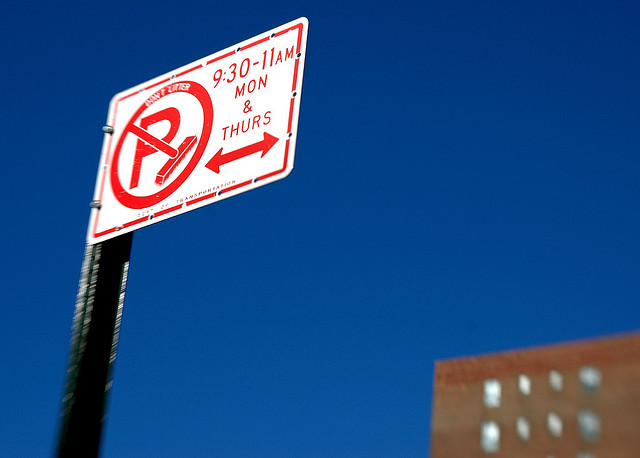I remember alternate side of the street parking. It was 1974, and I was underemployed and living on West 22nd Street. My tiny Renault and I were regular participants in the twice-a-week "slide" that Matt Flegenheimer described in his Monday Times story on Council Member Ydanis Rodriguez’s bill to bar police from ticketing alternate-side-parked cars once the street sweepers have passed.

The parking was free, but my loss of time and focus on Mondays and Thursdays (or was it Tuesdays and Fridays?) definitely was not. I soon switched to paid parking at Pier 40, with my bike as a shuttle. As I got more comfortable with city cycling I used the car less and less. Before the year was out, I sold it.
This long-ago moment came to mind when I saw Flegenheimer’s story, particularly the headline: “Council Aims to Ease a Parking Burden.” Forty years ago it was I who eased my neighbors’ parking burden when the alternate-side hassle motivated me to bail. But what if, back then, my 11 a.m. -- 2 p.m. tour of duty had been trimmed by an hour, or two? With a lower “time cost,” would I have hung on to free parking?
Maybe. And you can bet that if the Rodriguez bill passes, some present-day car-owning and car-storage decisions will be tipped toward street parking. Why pay a garage if the time cost of free street parking has been cut in half? Why rely on Zipcars or stick to destinations served by public transit if the city has made it easier to store your own vehicle on the street?
The problem is that it wouldn’t take a slew of such decisions to cancel the intended time savings that have car owners salivating over the Rodriguez bill. I don’t know the number, but I imagine NYC DOT does. And maybe Bruce Schaller, who just returned to the private sector after seven sterling years running DOT’s analytics, can figure out how many more New Yorkers will elect to store a car on the street if the bill becomes law.
The underlying reality, of course, is that free on-street parking isn’t a public good. As Rachel Weinberger and John Kaehny put it in their magnificent 2008 report on parking policy for ITDP:
While it is often asserted that parking is a “public good” and therefore should be free, a true public good is one whose use by one party does not impinge on its use by another (like a lighthouse or a TV broadcast). Although curbside parking uses public streets, it is clearly not a public good; each motorist who parks takes a potential space away from another motorist.
In just that way, each move to play parking Santa without charging a price stimulates an opposite reaction that cuts into the benefit, perhaps to the point of cancelling it altogether.
This dour scenario isn’t about “externality costs” like the collateral increase in congestion, crashes, noise and emissions from the increase in car ownership I’m positing. My calculus here is limited to the car owners themselves. Maybe it’s time for them to look this gift horse in the mouth -- or for NYC DOT to do it for them.





